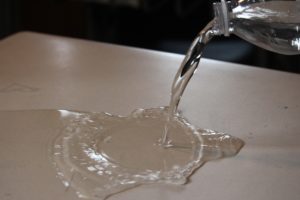Water is Wet–Soaking, Sopping, Wet
April 10, 2018
Imagine, a fish underwater, swimming in the sea, then, all the sudden, he takes a bite and is pulled from the water in which he lived. Now, holding that writhing fish in your hands, he’s sopping wet. So, wouldn’t he still be wet while he’s in the water?
The debate may have begun to die out but, here, we still debate.
Water is wet and even though it may not be a popular opinion, I’m sticking with it. However, I’m not alone. 49 percent of voters on Debate.org believe that water is wet and they each have their own reasons why.
One voter said, “The word ‘wet’ means saturated, covered or surrounded by another liquid. Because water can be separated into individual H2O molecules each one is surrounded by another one and that makes them wet because they are all surrounded/covered by another liquid–although an individual H2O molecule is not wet.”
On that note, let’s return to that fish, as he swims along he is ‘saturated’ in water, making him wet. Many people argue that water can only make other things wet by surrounding them, doesn’t that mean that the water molecules are wet. They are, by definition, surrounded by water?
Water can’t make things wet if it’s not wet itself. While some people argue, wet is just a feeling and water is wet when we touch it, doesn’t that mean that it is wet even when we aren’t feeling it? I mean people don’t constantly need to be feeling sad for the feeling to exist and still be prevalent.
On the same note, one Planet-science writer said, “Saying water is wet is like saying that wood is hard or fire is hot.” It’s just common sense. I mean, if water isn’t wet, what is it?































































































Dan Campbell • Apr 19, 2018 at 1:05 pm
Thus we have slipped into the realm of science…
The word “wet” has no operational scientific definition. Instead, scientists employ words with well articulated and differentiated meanings. Solutes can be solvated, liquids miscible, ionic compounds may be soluble when they dissociate readily in solvents, water produces spheres of hydration when ions are introduced. Intermolecular forces, specifically dipole-ion and dipole-dipole interactions arrange dihydrogen monoxide molecules such that electrostatic attractions are maximized and electrostatic repulsions are minimized. Thus achieving the lowest energy equilibrium state achievable by a given system and abiding by the second law of thermodynamics (second order equation of state known as Gibb’s Free Energy). Unfortunately, science can offer no justifiable conclusion on this most unscientific of terms.
Thus the argument still stands, is water wet? This debate is truly an argument of semantics (the meaning of words). One must first establish an operational definition of what “wet” is. Ashley and Matthew both argue that wet, should be/is defined as a state of being surrounded by water molecules. A bold definition indeed. Problems arise when one tries to interpret the state of the surface of water. These water molecules (at the interface between the lower liquid and atmosphere) are exposed to the atmosphere and thus would not be saturated with water, are they still wet? Or the inside surface of the glass beaker holding the water, these silicon dioxide molecules are not surrounded by or saturated with water molecules, are they still wet? Or the oil still floating on the surface of the Gulf, is it wet?
Wet should rightly be defined as the interaction of a liquid with some other substance. Thus we can accurately address the aforementioned issues. In particular: hydrophobic substances. Water is not wet, wet is not a property. Wet is an interaction, necessitating the existence of some other frame of reference, beyond water itself.
Matthew Powell • Apr 17, 2018 at 1:51 pm
Water is wet.
Let’s look at a few definitions of wet that can be found in dictionaries.
“covered or saturated with water or another liquid.” -Google
“moistened, covered, or soaked with water or some other liquid” -Dictionary.com
“consisting of, containing, covered with, or soaked with liquid (such as water)” -Merriam-Webster.
All water is wet, because all water is necessarily saturated with itself. Additionally, If we are to go with Webster’s definition, it could also be thought of as wet as water does contain water. The definition of wet at no point relies on the changing of an object due to a watery occurrence.
Water is Wet.